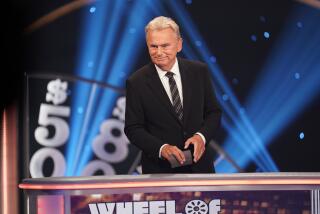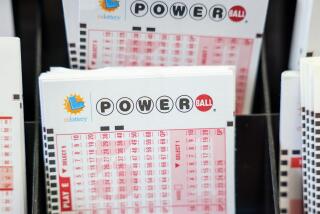Rich Beyond the Dreams of Avarice?
Last Wednesday morning when I was working out at the Pasadena Athletic Club the topic of conversation among my fellow athletes was that day’s lottery drawing. At that time, the jackpot was said to be $35 million.
We all agreed that $35 million would change your life. I asked my wife, who was riding a stationary bicycle, what she would do if I had the winning ticket and lost it. My workroom is in such disorder that if I put a letter aside for special attention, it is lost for weeks. Sometimes forever.
“I’d kill you,” she said, sounding as if she meant it.
I took that to mean that she thought $35 million would change her life in some profound way so that losing it through my carelessness would justify homicide.
I tried to imagine how $35 million would change my life. First, I thought, winning it would give me a good column. Enlightening, I thought, that a good column would occur to me first, before mansions and yachts and luxuries beyond dreams.
Most lottery winners say they are going to quit their jobs and buy a new house and a new car and help their families. I imagine that coming into $35 million would inspire several good columns, so naturally I wouldn’t be quitting my job overnight.
I wouldn’t especially want to buy a new house. I like our house. We paid $8,425 for it in 1950, and have doubled it in size and added a second bathroom and a swimming pool. What more does a millionaire need?
Of course I wouldn’t get the $35 million all at once. I remembered that they portion it out, after taxes, over 20 years. I’d probably only get about $1.5 million a year. So I couldn’t buy out The Times.
If I went crazy and bought a Malibu beach house, a London townhouse and a chateau outside Paris, I’d soon be overburdened by down payments and mortgages, and waiting for my next check. Remember Charles Laughton, the improvident beachcomber in “The Tuttles of Tahiti”?’ He inherits some money and goes on a spending spree, and when the bank tells him he’s overdrawn, he shrugs and writes a check for it.
Later that day I went to the barbershop for a haircut. The barber and his waiting customers were talking about the lottery. The barber asked me, “You buy a ticket yet, Jack?”
No, I said, I had never bought a ticket since the lottery began. It was like looking for one diamond raindrop in a cloudburst.
“Can’t win without a ticket,” someone said.
I went home to work. I couldn’t get the lottery out of my mind. What if I won and hadn’t bought a ticket? No, that didn’t make sense. Couldn’t win if you didn’t have a ticket. I didn’t even know how to buy a ticket.
I got in my car and drove down to the 7-Eleven and went up to the counter. A man ahead of me gave the clerk $1 and the clerk punched a key on a machine and an oblong ticket came out.
I gave the clerk $1. He reached for a pad, evidently to take down my choice of numbers. I pointed to the machine, remembering that you could let the machine make the choice.
“I want the big one,” I said.
He said, “$35 million?”
I said, “Yes. I want it all.”
He turned to the machine and pushed a key and out came an oblong ticket. I put it in my left outside coat pocket, making a mental note of which pocket it was, until I got it safely home. I put it on top of the bar and covered it with a clear plastic square paperweight. No way for it to get lost. When my wife came home I told her what I’d done. She said, “What numbers did you pick?”
“I didn’t pick any. I let the machine pick them at random.”
She said she was disappointed in me. I explained that I don’t believe in psychic foresight. Let the machine do it. If I believe in anything, it is Random Chance. My numbers were 2, 8, 21, 23, 25 and 32. The winning numbers were 25, 14, 19, 33, 46 and 41.
I got a column out of it, anyway.
More to Read
Go beyond the scoreboard
Get the latest on L.A.'s teams in the daily Sports Report newsletter.
You may occasionally receive promotional content from the Los Angeles Times.










